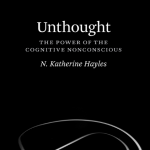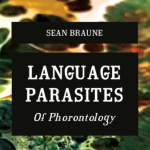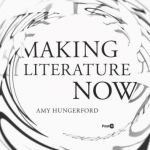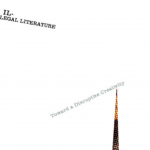2018
Cognition, as we've known for quite some time, is much larger than consciousness. And that realization can help explain literature's longtime, productive fascination with the unconscious. But today, when a scholar such as N. Katherine Hayles connects "nonconscious cognition to a wide range of technical, financial, and literary issues," we are set to fundamentally rethink the "nature and value of the humanities today."
For a journal like ebr, long devoted to peer-to-peer reviews (of writers for and by writers), the engagement by Jhave with Sean Braune's Language Parasites suggests a variation on that model. Their parasite-to-parasite encounter bodes well to supplement (if not overtake) the hidden, professionalized peer review models that keeps all of us so busy and so hidden from view - of one another, not to mention our potential audiences. What better outcome for born digital scholarship than the replacement of "double blind" peer review with a "phorontology" of ties that bind, "[extending] its embrace to all"?Sean Braune's publisher has offered ebr readers a free pdf of Language Parasites. Print versions can be ordered from Punctum Books
Without anonymous peer review, there can be no formal recognition of literary scholarship, and ebr is no exception. That said, our journal looks for occasions to turn our confidential reports into public riPOSTes, if the reviewer is so inclined. In this essay, our colleagues from Coimbra, Manuel Portela and Ana Marques da Silva, stage reflections on the peer reviews that their own scholarly work has generated, in earlier submissions to other peer review outlets. The "metapaper" that results, is a further step in the initiative not to do away with peer review, but to bring the process into the public sphere.
Ralph Clare reviews After Kathy Acker: A Literary Biography by Chris Kraus.
Berry, who with ebr editor Joseph Tabbi initiated the Fictions Present thread (circa 2006), finds few intersections of that project with Hungerford’s celebrated Making Literature Now, not least because Hungerford shows little interest in the question of how her titular concept, when applied to commercial and cultural productions, indie and alt endeavors, “manages to mean what those trying to make literature are trying to make.”
Gregor Baszak parses Nagle's celebrated, and "overdue" reconsideration of the internet, and social media in particular as a battlefield for politics.
2017
Dani Spinosa reviews David S. Roh's Illegal Literature a book about authorship, copyright, fair use and literary disruptions.
In this review of O'Nan's West of Sunset, Messenger explores 20th Century American literary history as a kind of contemporary metafictional myth. Using Scott and Zelda Fitzgerald as characters composing the life of a literary icon against the emergence of "Hollywood," O'Nan's work is considered a bittersweet meditation on the death of an author and the hope that his work lives on.
If the 1984 Ghostbusters film can be read as an early foreshadowing of the neoliberal transformation of the United States of America, how might the film’s 2016 sequel be interpreted? Ralph Clare reviews the new film in the context of his reading of the original in his 2014 book Fictions, Inc.
In this review, three social conditions of the Precarious (“precariousness, precarity, and (governmental) precarization”) are described. Furthermore, the neo-liberalist use of self-regulation as a means to exert control over individuals is exposed. The possibility to turn precarity into “a form of political mobilization,” as suggested by Lorey, is also explored.
2016
Andrew Lindquist reviews Michael LeMahieu's Fictions of Fact and Value, examining the influence of logical positivism on American literature of the postwar era.
Using recent events of planetary significance as a point of departure, Jeanette McVicker reviews The Planetary Turn: Relationality and Geoaesthetics in the Twenty-First Century, edited by Amy J. Elias and Christian Moraru.
Afterthoughts on the end of the sixties, the death of the author, the rise of Theory and the fall of humanism.
In this review of How to Be an Intellectual: Essays on Criticism, Culture, and the University, Christopher Findeisen analyzes Jeffrey J. Williams's assessment of higher education in the United States. Linking the decline of funding for universities and colleges, rising student debt, the exploitation of academic labor, and the digital humanities, the review examines the omission of accounts of "the not-so-remarkable everyperson academic, the untenured, the up-and-comers, and the downtrodden."
In this review of Heather Houser’s Ecosickness in Contemporary U.S. Fiction, Sharalyn Sanders identifies the hopeful potential for environmental justice via contemporary literature. Finding a solidarity implied between intersectional identities and ecocriticism, Sander’s finds in Houser’s call for “scholarly activism” an antidote to the detachment which threatens to thwart environmental awareness.
In reviewing James McFarland’s Constellation, Donald Cross reminds readers of the rich potential of scholarly discourse. Beyond mere citations and their absence, Cross traces across the bright stars of Nietzsche and Benjamin (and Derrida) relationships worthy of serious consideration. In an age of copy/paste citations, impact reports, and optimized academics, pondering the constellations offers an opportunity to rediscover the subtle intensity of tracing forms in the void.
2015
A serious (and playful) consideration of the power of “things,” Christopher Leise reviews Jane Bennett’s Vibrant Matter: A Political Ecology of Things through the lens of the Lego Movie. The implied dynamism of the manipulable modularity of the Lego world provides strong resonances with Bennett’s take on “thing-power” and distributed agency, while the crisis in the plot of the Lego Movie offers an apt illustration of the dangers of human exceptionalism discussed in Bennett’s text.
Joyce’s treatment of baseball in Going the Distance isn’t merely thematic, according to Punday, who believes that baseball (and its emphasis on numerical ordering) here represents the balance of the poetic and computational that defines Joyce’s electronic literature.
Ciccoricco acknowledges that Michael Joyce's new novel (Foucault, in Winter, in the Linnaeus Garden), which gives a fictionalized account of Foucualt's relationship to Jean Barraque, opens Joyce up to a broader range of criticisms, though Ciccoricco also argues that by focusing on a "productive and troubled time for Foucault," Joyce ultimately offers a "compelling meditation on what we might call the nexus of madness, philosophy, and literature."
In this essay, Laura Shackelford reviews Jeffrey T. Nealon’s “Post-Postmodernism.” Not merely an historical supplement to Fredric Jameson’s “Postmodernism,” but an attempt to devise a new critical method appropriate to our “just-in-time” present, Shacklford discusses its implications for literary practice in the 21st Century.









